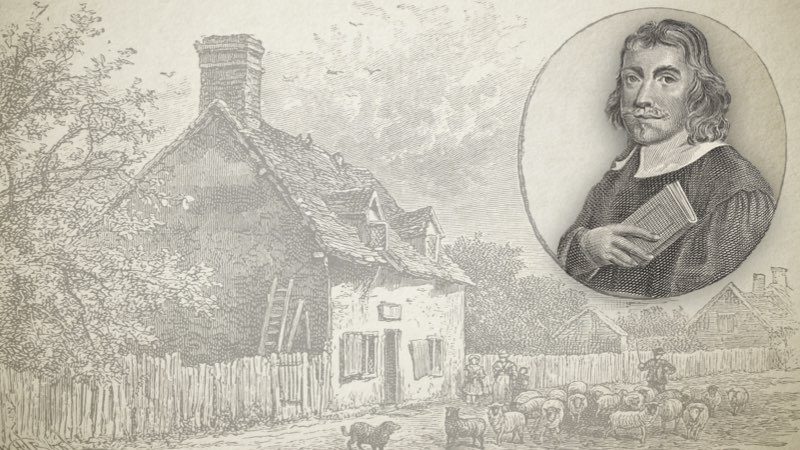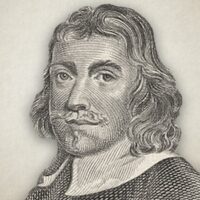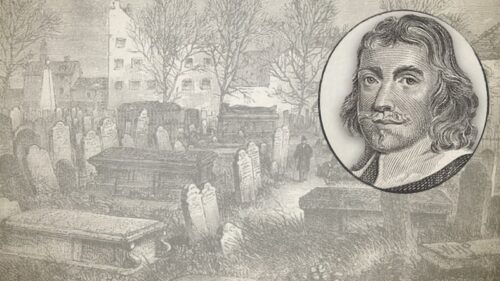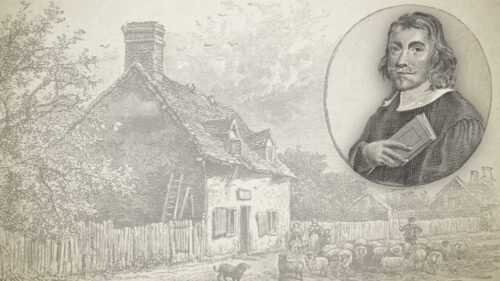
The Life And Ministry Of John Bunyan
Ken Connolly, “The Church in Transition”, Page 121:
The world into which John Bunyan was born was in a state of upheaval. Fierce political winds were blowing in shifting directions. Though the issue was political, those of Puritan persuasion defended the rights of citizens. When there was conflict between royal authority and the “responsibility” of Parliament, the Puritans always side with Parliament. Hence the debate became also a religious matter. The civil war erupted causing the king first to lose the throne, then his head. It also brought Puritanism, whether bane or benediction, to touch the moral conscience of the nation. These two factors would make the Bunyan years a time of stress. The excesses which normally result from political upheaval would be restrained by the equally powerful force of Puritan morality. That polarity would find its typical field of conflict in John Bunyan.
John Bunyan was born at Elstow, Bedfordshire, in central England, on November 30, 1628. He was the first child of Thomas Bunyan. The elder Bunyan was a tinker by trade, whose family had lived in the area since A.D. 1199. As a boy John was briefly sent to a village school where he learned to read and write. Most of his education, however, was acquired through reading the Bible at home. He also learned to work with his father as a tinker.
On his sixteenth birthday, John Bunyan joined the Parliamentarian army. He was stationed at Newport Pognell Garrison, about twelve miles from his hometown. His army existence introduced the young Bunyan to the doctrine of Puritanism. In the second year of his military life, Bunyan encountered a situation which would greatly influence his future. When the New Model Army marched off to fight the Royalties at the Battle of Leicester, a friend went in place of Bunyan. That replacement was killed in the ensuing conflict. His period of service in the Army gave him ample illustration of camps and fortresses, guns, drums, trumpets, flags of truce, and regimental banners. Like the faint watermarks on a page of paper, the soldiers in Parliament’s army appear to have been the backdrop of Pilgrim’s purpose and companions. In 1647 Bunyan returned home from the army. The following year he married a local girl. His new wife was a godly woman and gave him several Christian books to read. She very quickly had realized that her young husband neither was a Christian nor did he live like one.
Bunyan was the “chief of sinners.” He would attest to that. As the ringleader of the youth of Elstow in all manner of vice, he delighted on breaking God’s laws and “loosing the reins in the neck of his lusts.” How far in sin, however, did he go? He admitted that his four chief sins were: profane language, ringing the church bell, playing “tipcat” on the Sabbath day, and reading the worldly books. Through his wife he became a regular attendant at the local church, although the preaching against those sins made him very uncomfortable. Sometimes, he admitted, he could not do his misdeeds until he had suppressed his conviction in a sumptuous meal after the morning service. Nevertheless, the conviction grew. Sometimes, he would run from the church, fearful that the spire would pause just before another stroke at the tipcat to reflect on the eternal consequence of his action and then, with a “devil-may-care” attitude, continue assuming that he had sinned away his day of grace. Because of his deep conviction of personal sin, he attempted to reform in 1650, only to find that reform did not purchase for him peace with God.
Bunyan’s road from reformation to regeneration took three years to travel. It was obvious that reform was not enough when, while tinkering in Bedford, he overheard four women talking about their relationships with God. “Me thought they spake as if joy did make them speak.” It was obvious they had discovered another world and were walking in its freedom. “I would often,” he tells us, “make it my business to be going again and again into the company of those poor people.”
The next two years brought nearly unendurable torment to his soul. He was a pilgrim looking for the peace possessed by those four women. He could not find it. “I could have changed hearts with anybody,” he said. “My sin was point blank against my Saviour.” During those two years, Bunyan admitted, “I sat by the fire in my house musing on my wretchedness.” He envied the animals he saw or heard in the countryside The cattle or the toads had neither “doubts nor dooms…No everlasting hell-fires for them…” He said he would rather have been “anything but a man!”
Then Bunyan met a Mr. Gifford, changed his membership to Mr Gifford’s assembly, and exposed himself to preaching on salvation through the grace of God. Impressed by a sermon he read on “My grace is sufficient for thee,” and reading the “Introduction to Galatians” by Martin Luther, Christ’s imputed righteousness began to reign in his heart Gifford’s life is an interesting story in itself. Gifford was a Kentish man of a good family and education who fought on King Charles’ side in the Civil War. He was condemned by the Fairfax to be hanged for his Royalist activities. Gifford’s sister visited him the night before his scheduled execution and found the guards asleep and his fellow prisoners drunk. She devised a plan for his escape. She disguised him as a vagabond seeking assistance from past royalist supporters. Eventually, he settled in Bedford. Gifford became known locally as a swashbuckler, free with the wine cup and dice. The local newspapers record his “dumpish fits” and “wild things in the town, of public notoriety.” Gifford’s antagonism toward God even threatened the life of one Hamigton, a preacher of the Gospel. Finally, however, Gifford read a Puritan book which brought deep conviction and immediate transformation. He then joined a small group of unorganized Dissenters, some influential, and formed them into a Society. His exhorting and preaching led to identification with the Baptist and he soon became the minister. Bunyan was admitted to that assembly three years later, in 1653. Gifford was a great influence on the newly saved, Bunyan. In 1655 Bunyan moved from Elstow to Bedford. There, that same year his wife died. Again, it was Gifford who helped Bunyan fare this difficult period in his life. Through Gifford, Bunyan became a Baptist and a deacon in St. John’s Baptist Church.
Bunyan’s life was not free from controversy. In 1656 he began what was to become a longer career in writing. His first efforts were some sharply worded criticism against Quaker mysticism, a doctrine and a sect which he abhorred. He was equally condemning of the established Anglican Church. No two things, he contended, were farther apart than the form of prayer and the spirit of prayer. He further contended that a person may easily find the proponents of those separate poles: one can be found in the alehouse and the other in the jail house.
Bunyan also engaged in controversy with misters Kiffin and Danvers, two strong leaders of the Baptist denomination, though he held the same tenets of faith. Bunyan did not believe in defending the distinguishing tenets of the group where it might hinder a communion with pious Presbyterians and other Independents. All those polemics against religious doctrines with which he disagreed began Bunyan’s writing career. It would end only after some 60 publications. In 1657 Bunyan became the pastor of St. John’s Church in Giffords stead. Three years later, in November of 1660, he married for the second time. That same year he was arrested for preaching without a license. Because he refused to be licensed, he was sentenced to 12 years in prison.
When Bunyan’s imprisonment began in 1660, passions were hot. Confinement was rigid and his dungeons were putrid. His wife had petitioned the House of Lords for his release, but in vain He learned to make longtagged thread laces to support his family of a wife and four children, one of whom, a girl, was blind Bunyan loved his blind daughter with a particular tenderness.
The authorities tried every conceivable way to end his preaching career, promising him liberty if he would agree. He simply replied, “If you let me out today, I will preach again tomorrow”. In fact, he had such a commitment to his prison and became an impromptu pastor to those other unfortunate inmates of the Bedford county jail. In addition, much of his writing was done during the 12 years of incarceration.
In 1666 wrote “Grace Abounding,” the story of his conversion. The actual and full title was, “Grace Abounding To The Chief Of Sinners: Or a Brief and Faithful Relation of the Exceeding Mercy of God in Christ to His Poor Servant John Bunyan.” As the title explains, the book tells the story of Bunyan’s spiritual encounter with God. Printed while he was still experiencing it, he added to it as his pilgrimage progressed. In his 8th edition, for example, he defended himself against immoral accusations. He stated: “If all the Fornicators and Adulterers in England were hanged by the neck till they were dead, John Bunyan, the object of their envy, would still be alive and well.” The story is tender insight into his own life and ranks among such writings as Augustine’s Confessions and the heart utterances of Martin Luther’s Grace Abounding went through six editions during Bunyan’s lifetime. A copy of the first edition was made in 1883 and is presently in the British Museum.
In May, 1672 after years of petitions in his behalf, Bunyan was given permission to preach the Gospel of Jesus Christ. In September of that same year, he was released from prison. In 1672 Charles II had concluded the treaty by which he bound himself to set up the Roman Catholic religion in England. To take a giant step toward that end, Charles planned to annul, by unconstitutional exercises of his prerogative, the penal statutes against the Roman Catholics. That would require, if Charles would camouflage his real intent, that he would do the same for Protestant Nonconformists. That was the real reason John Bunyan was set at liberty. Bunyan was so impressed with the trend of events that he published a tract. He likened Charles to Cyrus who granted freedom to the Jews to return and build their temple.
In 1675 Bunyan resumed his pastorate. However, before that year was out, he endured term in prison, at the Bridge Jail. Three years later in February, 1678, Bunyan was able to bring out the first “Pilgrim’s Progress.” The popularity of “Pilgrim’s Progress” must be measured by the fact that it appealed only to those who read for spiritual edification. It was more popular in Scotland and the colonies than it was in England. When the literati read it, however, they treated it with contempt. In a critical work entitled “Spiritual Quixote,” Christian is likened to Jack the Giant Killer William Cowper’s couplet, written in 1782, fingered the pulse of the literary critic of Bunyan’s time:
“I name thee not, lest so despised a name,
Should move a sneer at thy deserved fame.”
That attitude, however, was to change 180 degrees. In 1831, when Thomas Babington Macauley wrote his “Essay on Southey’s Bunyan,” he affirmed that he “was not afraid to say that, though there were many clever men in England during the latter half of the 17th century, there were only two great creative minds: One of those minds produced the “Paradise Lost,” the other the ‘Pilgrim’s Progress.'” In his “History,” 20 years later Macauley further stated, “Bunyan is as decidedly the first of allegorists as Demosthenes is the first of dramatists. Other allegorists have shown great ingenuity, but no other allegorist has ever been able so to touch the heart…”
John Brown, a minister who succeeded Bunyan in Bedford, wrote a work entitled, “John Bunyan”, in 1885 and in his “Appendix II” Brown lists the languages and dialects into which “Pilgrim’s Progress” was translated. He lists three languages of the British Isles; ten of Northern Europe; eleven of Central and Eastern Europe; thirty-two of Asia; eight of Africa; seven of the islands of the Pacific; and three American. Most of these translations were made by and for the benefit of missionaries. Bunyan was a plain, self-educated man who wrote for a plain, uneducated people.
The “Holy War” is again explained by its entire title: “The Holy War, made by Shaddai upon Diabolus for the Regaining of the Metropolis of the world; of The Losing and Taking Again of the Town of Mansoul.” Macauley believed the “Holy War” would have been the greatest allegory ever written had it not been for the existence of “Pilgrim’s Progress.” Mansoul is a city with walls, gates, strongholds, and sallyport. It was taken by stealth from its founder, Shaddai. Diabolus was its new ruler. Prince Emmanuel, Shaddai’s son, appeared at the gate with 40,000 soldiers. All concessions pleaded for by Diabolus are declined and, once taken, the citizens are offered pardon rather than punishment. The city was constantly beset by seductions of one Mr. Carnal Security through the force of an army composed of “bloodmen” and “Doubters.” That army was solicited from two counties and another city. The men from “Blindmanshire” came in ignorance. Those from “Blindzealshire” were motivated by superstition. The city of Malice had men who fought through envy. After the force of bloodmen was resisted by Emmanuel’s men, the citizens were promised to have the city replanted in Shaddai’s country, to be henceforth free from outside pressures forever.
The close of Bunyan’s life was related by 14th century English poet Robert Southey as follows: “Reading was a place where he was well known…In a visit to that place, he contracted the disease which brought him to the grave. A friend of his who resided there had resolved to disinherit his own son. The young man requested Bunyan to interfere in his behalf He did so with good success, but it was his last labor of love; for, returning to London on horseback through heavy rain, a fever endued which after ten days proved fatal. He died at the house of his friend, Mr. Stradwick, a grocer, at the sign of the Star on Snow Hill, and was buried in that friend’s vault in Bunhill Fields burial grounds.” The date on Bunyan’s tombstone is given as August 12, 1688; but, having preached his last sermon on August 19th, historians have since corrected the date to August 31, 1688.
John Bunyan (1628-1688) was a sovereign grace preacher, author and poet. He was appointed the pastor of a non-conformist church in Bedford. Although he was a baptized believer, it is questionably whether the Bedford congregation was a Baptist church. He was an open-communionist, welcoming to the Lord’s Table all who professed faith in Christ. An open Table of this kind sidelines the ordinance of Baptism, thereby undermining a ‘Baptist’ identity. Nevertheless, Bunyan nurtured strong views on sovereign grace and is best known for his Christian allegory, “The Pilgrim’s Progress”.





